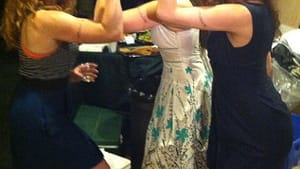Stay in the Loop
BSR publishes on a weekly schedule, with an email newsletter every Wednesday and Thursday morning. There’s no paywall, and subscribing is always free.
PWTF: Women tackle parity on Philly’s theater scene

At any show you’ve seen in Philadelphia, it’s likely that the director, producer, and playwright were men. In fact, in the last five years, men directed about 90 percent and wrote about 80 percent of the plays performed at Philadelphia’s largest-grossing theater companies. This isn’t coincidental. Rather, it’s a symptom of the way that women have been institutionally excluded from being major contributors to Philadelphia’s thriving theater scene — a problem that the Philadelphia Women’s Theatre Festival aims to address.
According to director of engagement Brie Knight, the main mission of the Festival is to create opportunities for women in theater and provide a platform for women’s stories and perspectives. “Women are major contributors [necessary] to creating a vibrant and healthy theater landscape, specifically in Philadelphia,” Knight said. The Festival knows that the category of “women” is not biologically determined — instead, it’s about how people self-identify. This distinction is significant in order to ensure that the Festival is as inclusive and accepting as possible.
From cabaret to Aunt Jemima
The Festival lineup includes four days of immersive, engaging programming designed to support and spotlight the recent work of local theater artists. There will be two mainstage productions, staged readings, solo and collaborative work, a comedy cabaret, workshops, panels, and networking opportunities. All of the work is original, selected from more than 100 submissions, which was a difficult process. “We evaluated the pieces based on if they had an engaging narrative, a clear play structure, strong characters (particularly strong women characters), feasibility of production for our first year, and strong and interesting thematic choices,” artistic director Polly Edelstein explained.
One of the staged readings is of a play by Knight herself entitled Pancake Queen, about the life of Nancy Green, who became Aunt Jemima, the face of America’s breakfast syrup.
“What drew me to this this story initially was the fact that this black woman and former slave became this marketing icon who is effectively modeled after a slave,” Knight said in May. “I thought to myself, ‘What must it have been like for Nancy to essentially become a slave again?’” Initially, working on the play made her feel some “outrage,” because Aunt Jemima, albeit a modernized version of her, is still on our tables today, and “her name is that of a caricature that was meant to keep black people subservient to whites.” The playwright came to love Green and the chance to tell her real story.
Joining Knight’s play is a reading of Lindsay Harris-Friel’s Wide Open Spaces. The mainstage produtions include Other Tongues by Alisha Adams (directed by Megan Diehl).

A ‘watershed moment’ for local women artists
The hope is that the diverse material presented will speak to the Festival audience and provide something for everyone. “The Festival is for those who thoroughly enjoy theater and are avid theatergoers, or those who just want to go out and have a good night and come work with some really cool women,” Knight said.
The Festival takes place from July 30 to August 2, and its timing couldn’t be better. Recently, other local companies have made headway toward gender equity in the theater landscape: Plays & Players Theatre hosted Mz. Fest in the spring to explore female stories, and EgoPo Classic Theater honors the work of female American playwrights in their 2015-2016 season. “Right now feels like a real watershed moment for women leaders in the theater world,” Edelstein said, “and I want to help capitalize on that and keep us working towards parity across all theater demographics.”
The Philadelphia Women’s Theatre Festival will take place at Asian Arts Initiative, 1219 Vine Street, Philadelphia. Full festival passes as well as individual event tickets will be available for purchase soon (watch the PWTF website for details).
At right: PWTF participants, including Brie Knight, in glasses, at the June 8 launch at Asian Arts Initiative. Photo courtesy of PWTF.
Sign up for our newsletter
All of the week's new articles, all in one place. Sign up for the free weekly BSR newsletters, and don't miss a conversation.
